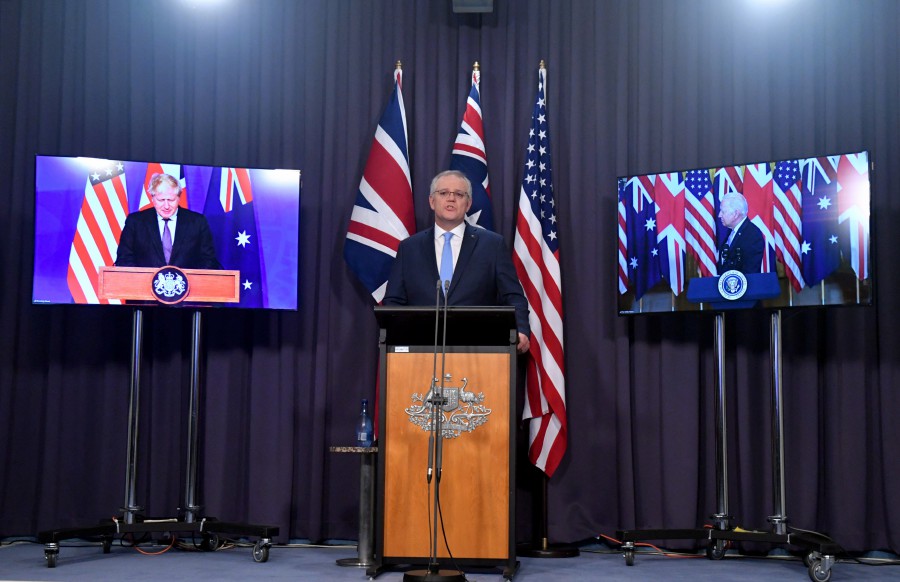AUKUS and Malaysia: Cats on hot bricks?
https://www.nst.com.my/opinion/columnists/2021/10/734789/aukus-and-malaysia-cats-hot-bricks
By Dr Mohd Hazmi Mohd Rusli and Dr Izyan Munirah Zaideen – October 8, 2021 @ 5:00pm

The Straits of Malacca and Singapore and the South China Sea (SCS) have, for centuries been vital to world trade, as these maritime routes form the shortest link from West to the East. Malaysia is one of the caretaker States bordering these important international shipping lanes.
These Straits are navigated by more than 80,000 vessels per year, dubbed as the second busiest after Dover Strait in Europe.
Malaysia has expressed uneasiness that AUKUS (Australia, United Kingdom and United States latest military pact) would enable Australia to develop nuclear-powered submarines through the trilateral security partnership with the United States of America and the United Kingdom.
So, should Malaysia be worried over this development?
The Strait of Malacca is relatively large in breadth in its northern part towards the Andaman Sea and it narrows down forming a funnel-shaped waterway as it flows south into the Strait of Singapore.
As the Law of the Sea Convention 1982 (LOSC) allows Malaysia and Indonesia to claim territorial seas up to 12 nautical miles in the Strait of Malacca, it leaves the Strait without any exclusive economic zone (EEZ) or high seas corridor for foreign vessels to exercise freedom of navigation while plying through it, as provided for in Article 58(1) of the LOSC. This also applies to the Strait of Singapore which entirely falls into territorial seas of Malaysia, Indonesia and Singapore.
As the maritime areas in the southern portion of the Strait of Malacca and the entire length of the Strait of Singapore are part of territorial seas of Malaysia, Singapore and Indonesia, foreign vessels, including military vessels do not possess the right to exercise freedom of navigation.
Nevertheless, the LOSC allows foreign vessels to exercise the right of innocent passage. Article 19(1) of the LOSC prescribes that foreign vessels do not need to acquire prior authorisation to sail through territorial sea belonging to another State unless if such passage is prejudicial to the peace and security of the coastal State concerned.
In such a situation, the coastal State may temporarily suspend the navigation of that recalcitrant vessel, as stipulated in Article 25(3) of the LOSC.
Does this mean that Malaysia could suspend the right of transit passage of any nuclear-powered military vessels plying through its territorial sea within the Straits of Malacca and Singapore, should such a passage is deemed prejudicial to Malaysia’s security?
Under international law, the answer is not in the affirmative.
Although parts of the maritime areas of the Straits of Malacca and Singapore are under Malaysia’s sovereignty, Malaysia’s regulatory capacity as a coastal State in governing ships plying through its territorial sea is subjected to the regime of transit passage, not innocent passage, as expounded in Part III of the LOSC.
When the LOSC came into being in 1982, it provided special navigational regime to be implemented in territorial seas which are part of straits used for international navigation – which includes the Straits of Malacca and Singapore.
As the Straits of Malacca and Singapore are crucial maritime conduits connecting Indian and Pacific Oceans, foreign vessels may exercise a more liberal transit passage regime which, according to Article 44 of the LOSC – could not be impeded, impaired and hampered by the State bordering the Strait.
Furthermore, the temporary suspension prescribed under the innocent passage regime does not apply in territorial seas forming parts of straits used for international navigation.
In other words, as a State-party to the LOSC, Malaysia is under the duty to ensure that the Straits are always open for navigation in any circumstances. The only situation where Malaysia may intervene if such a passage would cause or threaten to cause major damage to the marine environment, as stipulated in Article 233.
Other than that, Malaysia has no rights to impede, hamper or impair passage of vessels navigating the Straits of Malacca and Singapore.
Australia has reiterated that the development of its nuclear-powered submarines programme is not in contravention of international law. Developing nuclear-powered submarines is not in any way similar to developing nuclear weapons.
Following the unsettling fact that the unimpeded transit passage regime applies to the Straits of Malacca and Singapore, Malaysia has the reasons to get all worked up.
International law has put the obligation on Malaysia to allow its territorial sea within the Straits of Malacca and Singapore to be open for international navigation, including that of nuclear-powered vessels and submarines.
Would such navigation be detrimental to the nation’s security? Would this in any way adversely affect the pristine marine environment of the Straits of Malacca and Singapore?
China and India are two Asian nations already possessing nuclear-powered submarines. Does this region really need another nation possessing nuclear-powered submarines to keep it in shape?
These have to be answered and explained justifiably. Otherwise, many would remain restless like cats on hot bricks over AUKUS.
Associate Professor Dr. Mohd Hazmi Mohd Rusli is a lecturer at the Faculty of Syariah and Law, Universiti Sains Islam Malaysia. He is also a senior research fellow at the Asian Institute of International Affairs and Diplomacy (AIIAD), Universiti Utara Malaysia while Dr. Izyan Munirah Zaideen is a senior lecturer at the Faculty of Maritime Studies, Universiti Malaysia Terengganu.
